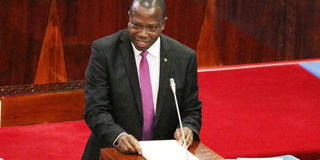Tanzania, DRC in discussions over Single Customs Territory

What you need to know:
Dr Phillip Mpango said here on Wednesday that he has instructed Tanzania Revenue Authority (TRA) to talk to the DRC on the matter and reach an amicable solution for the benefit of people of both nations.
Dodoma. The government is currently in discussions with the Democratic Republic of Congo (DRC) with a view to ironing out their differences pertaining to the latter’s use of the Single Customs Territory (SCT), the Finance and Planning Minister has said.
Dr Phillip Mpango said here on Wednesday that he has instructed Tanzania Revenue Authority (TRA) to talk to the DRC on the matter and reach an amicable solution for the benefit of people of both nations.
“I have instructed TRA to initiate talks with the DRC with a view to arriving at an amicable solution,” Dr Mpango said during an event where he received a dummy cheque worth Sh2 billion from Tanzania International Petroleum Reserves Limited (Tiper).
Dr Mpango could not tell when the negotiations will end.
Tanzania joined Kenya, Uganda and Rwanda in rolling out the clearance of goods under the East African Community SCT in September 2014.
The SCT simplifies and facilitates seamless flow of information between customs stations across partner states.
The existing business ties between Tanzania and the DRC saw the latter joining the arrangement in the hope that the move would increase efficiency of the Dar es Salaam port in clearing cargo meant for DRC and curbing tax evasion.
However, the implementation of the SCT saw several challenges that saw DRC businesses shifting their cargo to other sea ports within the region and resulting into a drop in cargo being handled at the Port of Dar es Salaam.
But according to Dr Mpango, the SCT agreement between Tanzania and the DRC has a clause that forbids each party from leaving the arrangement without issuing a six-month notice.
Earlier, the Tiper corporate affairs manager, Mr Bw Emanuel Kondi said the company faces a number of challenges in its operations including the SCT which – though well intentioned – has resulted into a drop in goods, including petroleum products passing through the Port of Dar es Salaam.
He said 53 per cent of petroleum products, passing through the Port of Dar es Salaam, is destined for neighbouring land-locked countries, indicating that Tiper - which operates Tanzania’s largest oil storage terminal – stands to benefit when neighbouring countries decide to use the port.
He also called upon the government to hasten the pace of implementing the planned Strategic Petroleum Reserve system, which he said would benefit the government, the country at large and Tiper in particular.
Commissioned in 1960s as an oil refinery, Tiper is a joined venture between the government and Oryx Energies.
Under Single Customs Territory, all five Partner States - Tanzania, Kenya, Uganda, Burundi and Rwanda - are regarded as one Customs Territory.
That means there shall be only one Customs declaration made in the country at which goods are consigned. Such one declaration replaces the system where imports to Rwanda, Burundi or Uganda require multiple customs declarations; first in Tanzania as transit goods and then in Rwanda, Burundi or Uganda as imports that ultimately involve two or more customs agents to clear the consignment.




